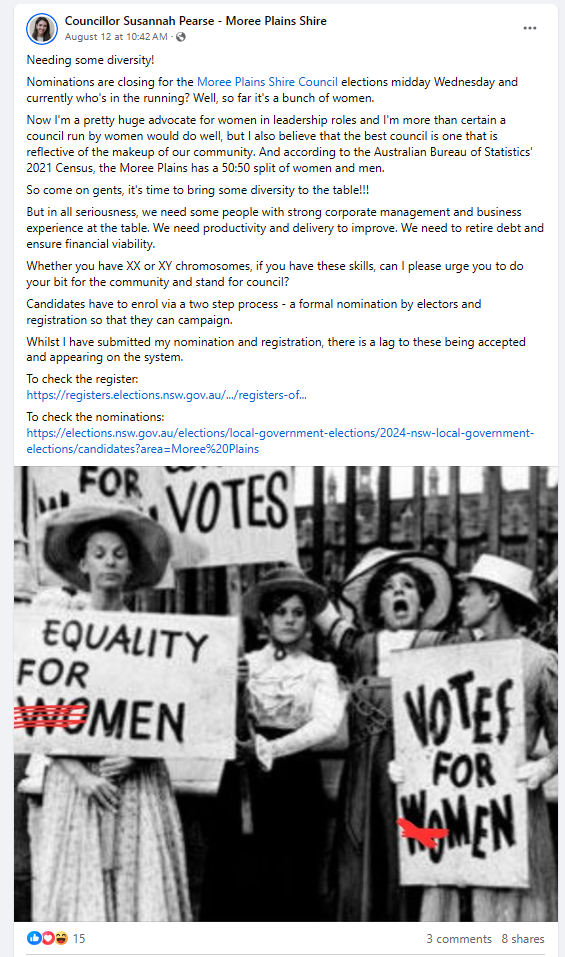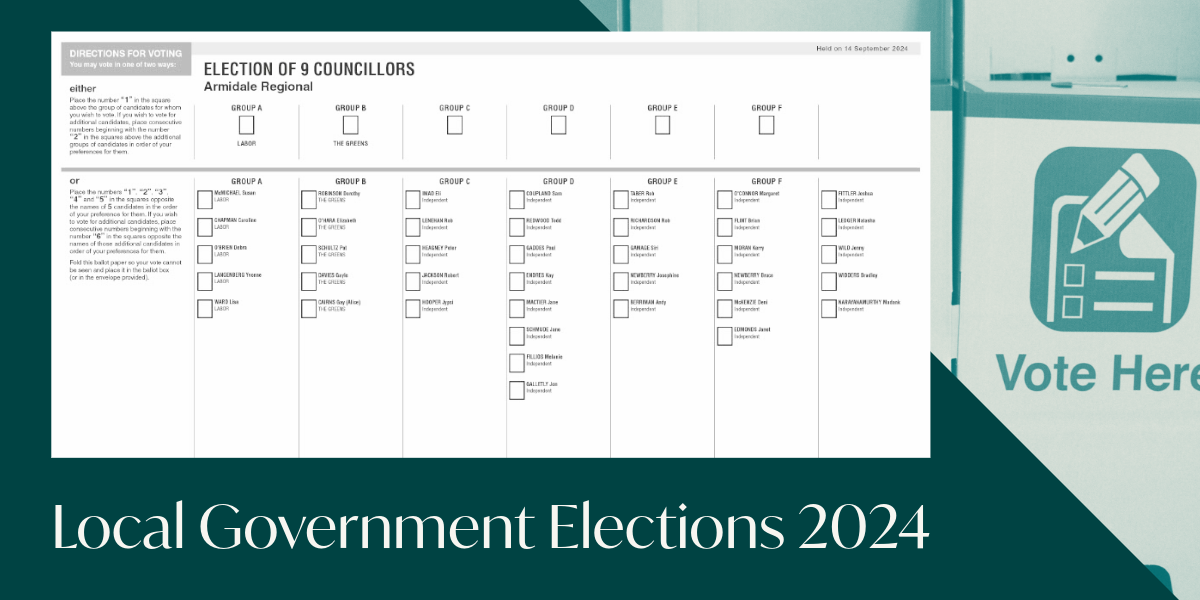Local Government elections are notorious for not really engaging voters, but does the number of candidates on the ballot make a difference? Is it a good thing or bad thing to have lots of candidates?
Within the New England we have both extremes: Uralla and one ward in Tenterfield have already been declared because they didn’t get enough candidates to actually have an election. At the other extreme, Armidale has 39 candidates on the ballot at Narrabri has 38, vying to fill just 9 seats each.
Diversity and contest is good
Professor Joseph Drew, a leading expert in local government economics and New England local, says that more diverse communities need a more diverse range of candidates to choose from.
“If you have a democracy in a heterogeneous population, which is what we’ve got now in Australia, you’re going to need to have lots of candidates representing lots of different ideologies, or you won’t have a representative democracy. It’s as simple as that.”
“It’s a function of heterogeneity… for every 1% heterogeneity, you get to pay an extra point 2.5% to deliver the services. Because you’ve got lots of different people wanting lots of different things, it makes it very inefficient.”
“One of the costs is lots of candidates, but if we believe a democracy should be representative of the different thoughts and ideologies and positions of people in the community, well the more candidates the merrier.”
However, Armidale Regional Council member running for his third term, Brad Widders, is concerned that the majority of candidates are neither diverse, nor representative of the community. If elected for the third time next weekend, Widders will be the youngest member of Armidale Regional Council, as he has been on the last two councils. In an area that has a much younger average population than anywhere else in the region, and indeed one of the youngest in regional Australia.
“It’s an indictment of where politics is in Armidale – they talk about growth and moving forward, but I’d say at least 60% of the candidates won’t be around to see it,” Mr Widders said.
Widders has personally been on the receiving end of some poor behaviour by his colleagues, much of it with racist overtones.
“Being Aboriginal, and being the youngest, has made it pretty hard.”
“I’m pretty good at calling it out, but I think there’s an underlying disdain there.”
Mr Widders is ungrouped on the Armidale ballot, and along with a prominent community support worker known for his work in the Ezidi community, Madan K Narayanamurthy, will be appealing for supporters to vote below the line for more diverse representation, rather than for one of the group tickets.
Narrabri is also not winning the diversity stakes, with almost all the candidates being male and nearing, or past, retirement age. The inspiring Lisa Richardson, who lives with endometriosis and was the youngest ever person elected to Narrabri Council at 34, is not recontesting after her unexpected pregnancy last year.
Meanwhile next door in Moree Plains Shire, Deputy Mayor Susannah Pearse went to great lengths to get more candidates to run, including helping her opponents submit their ballots, because she wanted the contest. At one point, it looked like Moree would be the opposite of Narrabri, with an all female council still a possibility.

Bad behaviour equals unhappy constituents equals more candidates
So what is driving such a large turnout in candidates in these two races? All signs point to mismanagement and misbehaviour. To put it in the most simple terms, when politicians do bad things, lots of other people think they can do it better.
Armidale Regional Council badly managed the process for its Special Rates Variation (SRV), and has been widely criticised for the bitter disputes and poor behaviour amongst councillors.
Professor Drew says the SRV process often results in a large field of candidates at the next election.
“Councils sometimes delay seeking a rates variation until it becomes a significant issue, at which point there is significant community backlash.”
“Every time there’s a big, contentious issue, you get lots of candidates afterwards,” he said.
Widders, himself the target of significant racism and bullying from his fellow councillors, says the poor behaviour of council members is also disservice to the work of Council.
“The organisation is going in the right direction, and there’s lots of massive, good things going on,” he said.
Widder pointed to the airport development, advancements in water security, East End Mall redevelopment, and other works.
“There’s hardly an empty shop in the mall. The operational side of Council is killing it.”
“There’s too many big personalities on the governance side that are trying to claim glory.”
Over in Narrabri, their financial management woes cost them a General Manager, with the State Audit office issuing a scathing report detailing “significant issues”, allegations of conflict of interest as well as procedural games, similar to those seen in Armidale, to try and stack votes and stop meetings.
Bad behaviour in councils has also been highlighted by the NSW Government, who this week released a discussion paper proposing a a complete rewrite and simplification of the Model Code of Conduct as well as a number of new pathways for addressing poor councillor behaviour.
Minister for Local Government Ron Hoenig said there were 4,289 code of conduct complaints lodged over the last three years alone, forcing councils to divert significant time and money from providing local services to resolve these complaints.
“The current councillor code of conduct system is fundamentally broken,” the Minister said.
“It is too open to weaponisation, with tit-for-tat complaints diverting critical council resources and ratepayer money from the things that matter most to communities.”
The new code of conduct system would see minor complaints about councillor misbehaviour dealt with by a councillor’s peers, including giving mayors more powers to remove councillors from meetings, and leave serious matters relating to conflicts of interest to be examined by the Office of Local Government.
The government is also putting forward reforms to improve transparency of council meetings to ensure decisions are being made openly and in the best interests of the community as a whole.
The decision to release the discussion paper on the eve of the local government elections is, in and of itself, questionable. Labor insiders say the announcement was a deliberate swipe at Cumberland City Council in Western Sydney, one of the few Councils in the city where Liberal Party candidates were successfully nominated, and where 84 code of conduct complaints were lodged in one year, none having merit. 71 candidates have nominated for the 15 seats across the five wards of Cumberland City Council.
Too many unknowns and empty rhetoric
Regardless of the motivation for the large turn out in candidates, their sheer volume of names on the ballot is unlikely to result in nuanced or detailed consideration of the options the voter has to choose from.
Research in voter psychology indicates that the cognitive load of having to consider the excessive number of candidates on the Armidale and Narrabri local government election ballots means that most will just donkey vote. That’s not a great democratic outcome obviously and cancels any good that may be derived from compulsory voting.
“Most people will have no idea who the candidates are when they turn up on the 14th, and they certainly won’t know their policies,” Professor Drew said.
Mr Widders agreed.
“The vast majority of people do not have a clue about who’s on local government. They only vote because they have to.”
Although voters may prefer the choice of lots of candidates, they may also be overwhelmed by the task. To reduce the cognitive burden of making complex electoral decisions, voters use information shortcuts, with party, name recognition and empty rhetoric often being enough to win.
“My biggest issue is that Sam Coupland’s running on this growth thing, but it’s telling Council to do stuff it’s already doing,” Mr Widders said.
As already noted by New England Times, to achieve the growth targets that are central to the Coupland campaign, council would have to do precisely nothing, as organic growth well exceeds the stated targets.
“And every other group is running on the trains, or the rail trail, which we don’t have any say over, because it’s now in the hands of State Government.”
Widders says the people who don’t care about the hijinks and drama, and just want to get on with their lives, are forgotten about in the jostling for cheap promises about issues Council can’t control.
“You’ve got young people who get forgotten about; you’ve got minority groups who get forgotten about,” he said.
“Young families get forgotten about because you think about things like footpaths in Armidale, they’re no good, but one cares about whether you can get your pram or where the kids can ride their bikes.”
Professor Drew expressed similar frustrations, saying voters often make their decision based on federal or state issues local council has no say over.
“Standing in line every local government election, I hear people say, ‘I’m not voting for them because they didn’t put the pension up’, or’ they spent the money on the submarines’, and other things that are not what local government actually does.”
“It undermines democracy if you have got lots of candidates and people don’t know what the candidates are standing for and what their position is,” Professor Drew said.
Research has found that the overwhelmed or disinterested voter will either vote to type, for the names or parties they know, or they make no decision at all, leaving the ballot paper blank, or donkey voting (numbering the first box 1). The likely beneficiaries of having too many candidates on the ballot and high donkey voting is Labor: the party endorsed ticket has drawn poll position in Armidale, and while labelled ‘independent’ and campaigning with logos or other identifiers, the Group A ticket in Narrabri is headed by school teacher Joshua Roberts-Garnsey who was the Labor candidate for Barwon in last year’s election.
The local council election is being held on September 14, 2024. Voting is compulsory. See a full list of the candidates in the 12 LGAs of the New England here, or on the NSW Electoral Commission website.
Read all the way through to the end of the story? So did lots of other people. Advertise with New England Times to reach New England locals who are interested and engaged. Find out more here.

